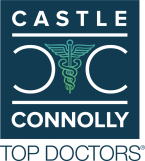Dr. Pannullo is a Professor of Neurological Surgery at Weill Cornell Medicine. Both a neurosurgeon and a neuro-oncologist, Dr. Pannullo is board-certified in neurology and neurological surgery, is fellowship trained in neuro-oncology, and has completed specialty training in stereotactic radiosurgery. She is one of the few neurosurgeons in the world with a neurosurgical practice focused only on stereotactic radiosurgery. In addition to her clinical practice, Dr. Pannullo is an internationally recognized educator, researcher and healthcare policy advocate. She has served in a variety of national leadership positions including the National Brain Tumor Society, the American Association of Neurological Surgeons, and the Brain Tumor Foundation, and chairs the Board of Trustees for The Washington Center, in Washington, DC.
 TRAINING
TRAINING
Dr. Pannullo received her undergraduate degree with honors in anthropology from Cornell University and her medical degree from Cornell University Medical College. Following a medicine internship at Harvard-Beth Israel Medical Center, she completed a neurology residency at New York Hospital-Cornell Medical Center. Dr. Pannullo was an American Cancer Society Fellow in Neuro-oncology at Memorial Sloan Kettering Cancer Center. She then completed a second residency in neurological surgery at New York Hospital-Cornell Medical Center and Memorial Sloan-Kettering Cancer Center, becoming the program’s first female graduate.
RESEARCH
Dr. Pannullo’s research portfolio has included clinical studies at NewYork-Presbyterian/Weill Cornell Medicine and Memorial Sloan Kettering Cancer Center as well as laboratory research at the National Institutes of Health. She has served in a series of escalating leadership positions in the Weill Cornell research enterprise, most recently as Chair of a Cancer Institutional Review Board. Dr. Pannullo collaborates with faculty and students in the Department of Biomedical Engineering at Cornell University’s Ithaca, New York, campus to develop novel devices to address challenging neurosurgical conditions and bridge the gap between engineering and medicine to improve human health.